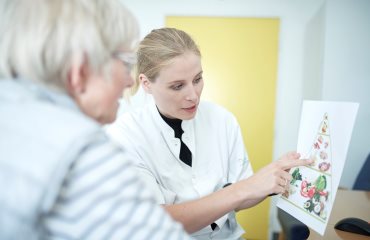How to keep up compliance in an intervention study?
Center for Liver Research runs REDUCTION a 6 months dietary intervention study for patients with type 2 diabetes. But what tools do we use to teach our participants about the diet, and how do we keep the participants motivated under the entire study period?

The potentiel effects of a low carb/high fat diet
80-90% of people with type 2 diabetes have Non-Alcoholic Fatty Liver Disease (NAFLD). As a large number of people worldwide are diagnosed with type 2 diabetes it means that NAFLD will be a common diagnosis for many people in the years to come. Some of the people with NAFLD will end up with cirrhosis which has big consequences for health and life quality.
80-90% of people with type 2 diabetes have Non-Alcoholic Fatty Liver Disease (NAFLD). As a large number of people worldwide are diagnosed with type 2 diabetes it means that NAFLD will be a common diagnosis for many people in the years to come. Some of the people with NAFLD will end up with cirrhosis which has big consequences for health and life quality.
“When such a huge group of people is at risk of getting diagnosed with NAFLD in the future it is important to find out who we should follow carefully in the clinic, and how we can treat and stop the progression of the NAFLD disease” – Mie Balle Hugger, Pregraduate student at FLASH
In REDUCTION we investigate if NAFLD and gut dysbiosis can be improved by changing the diet, with a reduction in carbohydrates and an increased fraction of fat, specially monosaturated fat. REDUCTION is a randomized controlled trial with two groups. One group will eat low carb diet (LCD) and the other one regular diabetes diet (RDD). The separation of the groups is randomized via a computer program, which means that neither researchers nor participants can decide what diet the participant has to eat. Before and after the diet intervention we do different kinds of examinations including a liver biopsy.
THE IMPORTANCE OF A MULTIDISCIPLINARY TEAM
In order to assure high quality throughout the whole project a multidisciplinary team is essential, and the REDUCTION team consists of hepatologists, endocrinologists and a dietitian. We have different roles, but a common goal which ensure the quality of the study.
The dietician is an important member of the team to keep the participants motivated and well informed during the project. The dietician teaches the participants in person about the diet intervention before starting the diet. This includes an introduction at Madlog on the internet. Madlog is a tool where the participants can register diet plan, learn nutrient distribution and keep up motivation. But it is also a tool for our dietician to follow the participants and find out where to help them.
In order to assure high quality throughout the whole project a multidisciplinary team is essential, and the REDUCTION team consists of hepatologists, endocrinologists and a dietitian. We have different roles, but a common goal which ensure the quality of the study.
The dietician is an important member of the team to keep the participants motivated and well informed during the project. The dietician teaches the participants in person about the diet intervention before starting the diet. This includes an introduction at Madlog on the internet. Madlog is a tool where the participants can register diet plan, learn nutrient distribution and keep up motivation. But it is also a tool for our dietician to follow the participants and find out where to help them.
“Following a diet for six months is not easy! My role is to carry out checkups, offer my support, arrange monthly events, and establish a close relation to each of our participants. All in all, I do my very best to keep our participants motivated and make sure they stick to the diet” – Jane Møller Jensen, Research Dietitian
During the study period the dietician will call the participants after the first 14 days and every month thereafter. The participants are welcome to contact our dietician if they have any questions. We also provide group meetings where participants can learn from each other and share recipes.
Before and after intervention
So far REDUCTION has included 101 participants out of expected 186 and many participants have enjoyed being in the project and have experienced some personal gains. Lau Andersen a former participant has shared his view on the study and how he managed to change his diet:
So far REDUCTION has included 101 participants out of expected 186 and many participants have enjoyed being in the project and have experienced some personal gains. Lau Andersen a former participant has shared his view on the study and how he managed to change his diet:
“I was aware that researchers from Odense University Hospital were looking for participants to the project Reduction after a liver examination at Nyborg Hospital. I contacted the researchers and shortly after I was enrolled in the project. I was Randomized to the LCHF group and my first thought was that I had enough fat to carry already. It turned out that the diet resulted in reduced insulin requirement and no weight gain. In periods where compliance to the diet was more difficult I used Madlog and LCFH cookbooks. I still eat LCHF after completion of the project because of all the personal health benefits I have experienced” - Lau Andersen, former participant
About REDUCTION
REDUCTION is funded by Novo Nordisk Fonden and we expect the study to continue until January 2022.
REDUCTION is funded by Novo Nordisk Fonden and we expect the study to continue until January 2022.